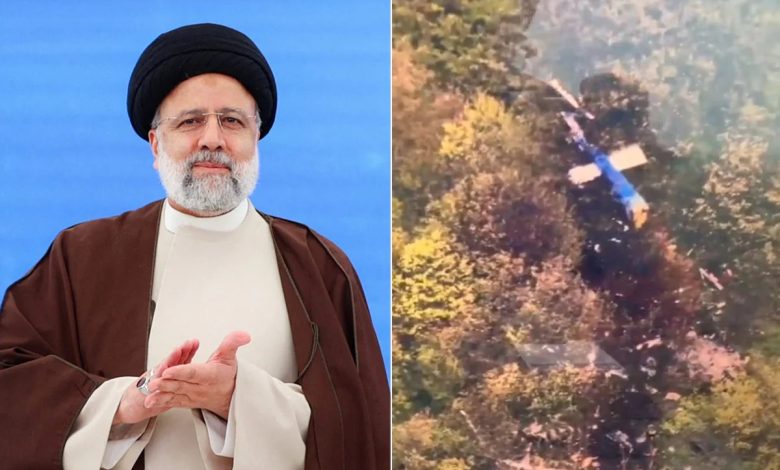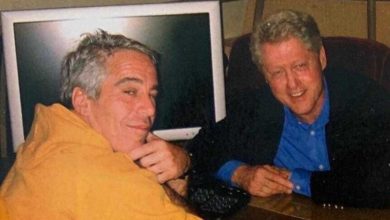BREAKING: Iranian President Ebrahim Raisi Killed In Helicopter Crash

Iran’s hardline President Ebrahim Raisi was killed when a helicopter carrying the reviled leader known as the “Butcher of Tehran” crashed in a remote region of the country Sunday, officials and state media said.
Raisi, 63, his foreign minister and other passengers were found dead after the rescuers discovered the helicopter crash site early Monday.
The President of the Islamic Republic of Iran, Ebrahim Raisi, is dead. pic.twitter.com/P2c5VHiduk
— Sarah Raviani (@sarahraviani) May 20, 2024
State news agency Mehr reported “all passengers of the helicopter carrying the Iranian president and foreign minister were martyred.”
An Israeli official quickly denied the country had any involvement in the crash.
“It wasn’t us,” the official said Monday.
Supreme Leader Ali Khamenei, who holds ultimate power with the final say on foreign policy and Iran’s nuclear program, said First Vice President Mohammad Mokhber would take over as interim president, the state’s IRNA news agency reported.
“I announce five days of public mourning and offer my condolences to the dear people of Iran,” Khamenei said in a statement.
A senior Iranian official had earlier confirmed that Raisi was killed in the wreck after state media reported there was “no sign of life” at the crash site.
“President Raisi, the foreign minister and all the passengers in the helicopter were killed in the crash,” the senior Iranian official told Reuters.
Raisi’s helicopter was found around dawn Monday in a mountainous area about 12 hours after it went down in hazardous weather.
Raisi was returning home with Foreign Minister Hossein Amirabdollahian and local officials through heavy clouds and dense fog after traveling to neighboring country Azerbaijan to open a new dam with President Ilham Aliyev.
State media initially reported the aircraft had experienced a “hard landing” and that initial rescue efforts were stymied due to severe wind and fog and the region’s rugged, unforgiving terrain.
Raisi was flying a US-made Bell 212 helicopter at the time of the crash, state media reported.
Iran’s official news agency INRA said Raisi was traveling in a convoy of choppers when his went down near the city of Jolfa, about 375 miles northwest of Tehran.
Reuters also reported the helicopter was completely burned after it crashed.
The crash comes at a time of growing dissent within Iran over an array of political, social and economic crises.
Since Iran’s ally Hamas attacked Israel on Oct. 7, provoking Israel’s assault on Gaza, conflicts involving Iran-aligned groups have erupted throughout the Middle East.
A long “shadow war” between Iran and Israel also broke into the open last month with tit-for-tat exchanges of drone and missile fire.
Messages of condolence have been pouring in from Iran’s allies, including the leaders of Saudi Arabia, Syria, Egypt, the United Arab Emirates, Qatar, Jordan, Iraq and Pakistan.
Russian President Vladimir Putin called Raisi “a true friend of Russia,” while Indian Prime Minister Narendra Modi said he was “deeply shocked and saddened.”
All eyes have turned to what Raisi’s death might mean for Iran’s government.
Under Iranian law, Mokhber will be president for a custodial period of 50 days, at which point an election must be held to choose Raisi’s successor.
But the real succession drama would center around who steps up to be the Islamic Republic’s next supreme leader, a role currently held by 85-year-old Imam Sayyid Ali Khamenei.
Most pundits believed the likely competition to succeed Khamenei came down to a two-man race between Khamenei’s son Mojtaba and Raisi, Gabriel Noronha, a former US State Department adviser on Iran, noted on X.
He pointed out that should no one step up to challenge the current supreme leader’s son, he would be all but assured to get the position, effectively making Iran a “hereditary monarchy — just in radical Islamic clothing.”
Iranian state TV suspended regular programming after news of the crash, instead broadcasting mass gatherings around the country showing supporters solemnly praying for Raisi.
Days after Iran’s failed missile and drone strike against Israel last month, Raisi rattled his saber at an annual military parade, threatening a “massive and harsh” response should Israel retaliate, and warning that if Tehran had wanted to carry out a bigger attack, “nothing would remain of the Zionist regime.”
Raisi won Iran’s 2021 presidential election, a vote that saw the lowest turnout in the Islamic Republic’s history.
He was sanctioned by the US in part over his involvement in the mass execution of thousands of political prisoners in 1988 known as the “death committee” at the end of the bloody Iran-Iraq war.



